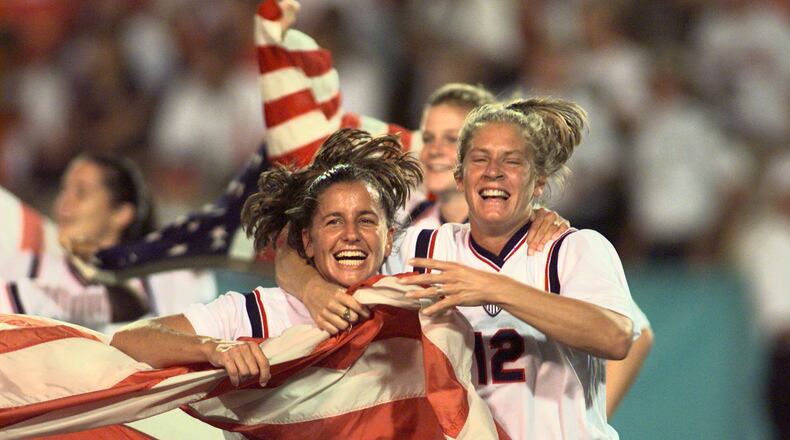On the 25th anniversary of the 1996 Atlanta Olympic Games, The Atlanta Journal-Constitution presents a series of retrospectives produced by the University of Georgia’s Carmical Sports Media Institute. The Eyewitness to History interviews offer the view of someone who was at a top moment on the Summer Games.
In 1990, the International Olympic Committee shocked the world when it selected Atlanta over five other cities — including Athens, Greece, which hosted the first modern Games in 1896 — to host the 1996 Centennial Summer Olympics. Billy Payne, who played for legendary University of Georgia football coach Vince Dooley, led the bid.
Dooley was coach of UGA’s 1980 national championship football team and the athletic director for more than 20 other UGA national titles. He also was heavily involved in Athens, Ga., hosting a 1996 Olympic championship in a different kind of football.
The Centennial Games saw six events make their Olympic debuts, including women’s soccer. After a round-robin group stage in four other cities across the United States, the semifinals and gold medal match took place at Sanford Stadium. The field was reshaped, and Sanford’s famous hedges were temporarily removed.
Athens also was a stop on the 1996 Summer Olympics torch relay. Payne carried the torch into Stanford Stadium with his daughter and son. According to Dooley, Payne paid respect to his late father, Porter Payne (who also played for Georgia), before passing the torch flame to Dooley. Dooley ran through the campus and then passed the flame on to the university’s president at the time, Chuck Knapp.
“I was very proud of that special moment,” Dooley said.
During the Games, Dooley was among the 76,481 in attendance for the soccer gold medal match, a then record-setting crowd for a women’s sporting event -- as the U.S. women beat China 2-1.
“I went over to Tokyo for the finals when they selected the city that would host the Olympics. I was there primarily to support Billy, because the odds were very much against Georgia back then. … I was also there just in case they won, as the athletic director, so that we might have some events in Athens. As it turned out, I saw Billy that next morning. We had breakfast, and I said, ‘Don’t forget your hometown,’ because he was born here in Athens.
“When it came time for the soccer people to come study the possibility of Athens hosting it, I was there to greet those people ... and I remember distinctly them being amazed at this facility that was only used about six or seven times a year. ... So, in any event, we had to do some restructuring of the hedges. By restructuring, I mean, the first thing we had to do was to take out hedges.
“Taking out the hedges was one of the big PR challenges, because while they’re old Chinese Ligustrum Privet hedges, to the Georgia people, they were the royal hedges, the sacred hedges. It was going to be hard for them to understand that you would take out the hedges in order to play soccer in Sanford Stadium.
“The plant pathologist discovered that the hedges had nematodes, and it gave me a good reason to let our Georgia people know that this was a blessing in disguise. And thank goodness for the nematodes, and thank goodness for the fact that they felt better that it was a blessing in disguise. The hedges were replaced with the sons and daughters of the original hedge, which we called ‘Hedges II.’
“Once you got into (the women’s soccer final), you wanted to win, and it was obviously a pretty tight game when the score was 2-1. The crowd really got into it as I remember. ... It was like the home field, and they were women for the first time in the Olympics, and the enthusiasm of the players you could tell. It certainly excited the fans, and I think we outnumbered the Chinese in the stadium. They had some supporters, but it was our home field so to speak.
“Everybody likes a winner, particularly if it’s a winner from your country, and particularly if you have any event in Sanford Stadium. Many, many people from around the world came in for the gold medal game and it was a great promotion for the university and for Athens, Georgia.
“I still got this great picture that was taken of the USA team with their gold medals, and behind them was our scoreboard. It said Georgia Bulldogs. USA 2, China 1. … It was just incredibly exciting. ... I’m (looking at) that framed picture right now that I have. I have it in a special place, which will be one of the great memories of my life.”
George Zeliff completed this interview as a student at the University of Georgia’s Carmical Sports Media Institute.
Eyewitness to History: Patriotism highlights Agassi gold medal
About the Author
Keep Reading
The Latest
Featured
